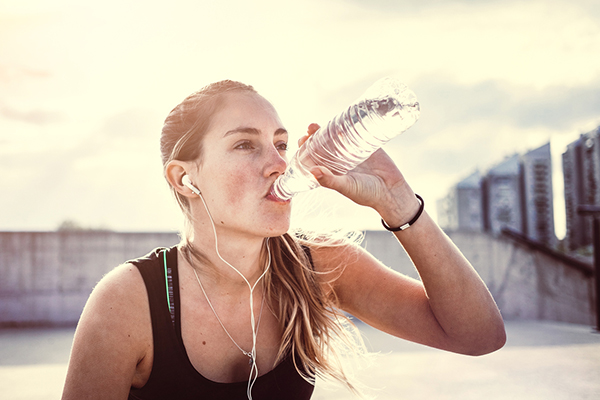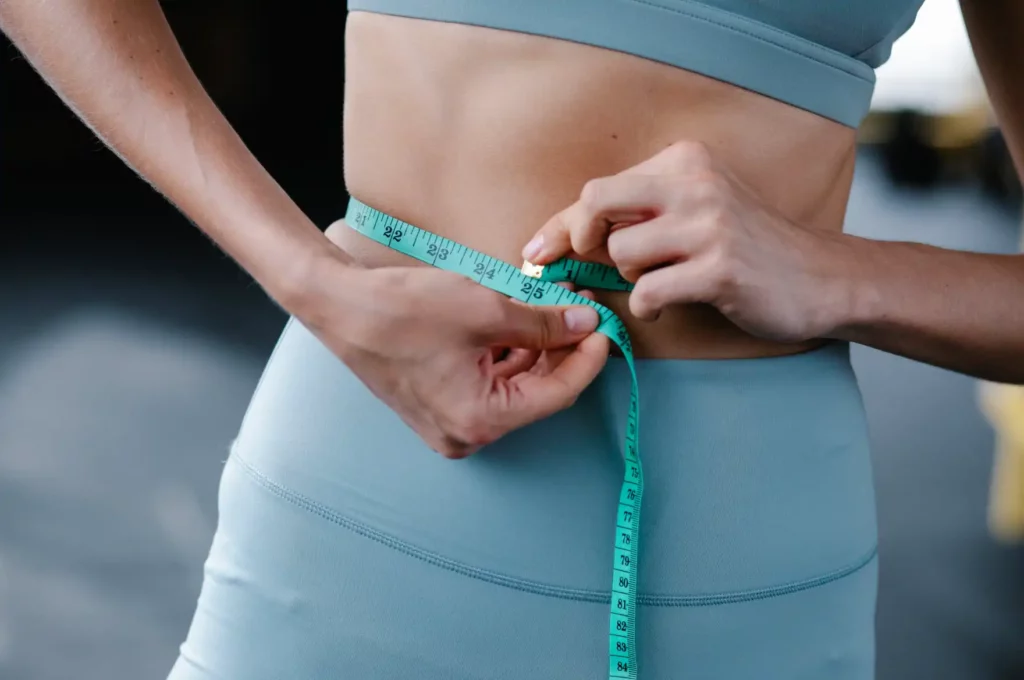Water Weight: What’s the Deal?
Water weight, simply put, is the extra water your body holds onto. This can definitely influence what you see on the scale. Think of it like this: your body is about 55% to 78% water, so fluctuations are normal. But sometimes, that balance gets a little off, and you retain more water than usual, and is it good to lose water weight? Well, many people want to drop water weight quickly, often to fit into a specific outfit or for a weigh-in. But what causes this extra fluid retention anyway?
Several factors can contribute to water weight gain. A big one is sodium intake. When you eat a lot of salty foods, your body holds onto water to dilute the sodium concentration in your system. Hormonal changes, particularly in women during their menstrual cycle, can also cause water retention. And honestly, inactivity plays a role too. When you’re not moving around much, your circulation slows down, which can lead to fluid buildup in your tissues. Things like certain medications or underlying health conditions can also be the culprit. When it comes to how much water weight we carry, it varies wildly, and is it good to lose water weight? For a short term fix, maybe, but that depends.
Now, why are people so interested in losing water weight? Sometimes, it’s about aesthetics – wanting to look and feel leaner. Other times, it’s related to a specific event, like needing to make weight for a competition. But, and this is important, it’s vital to understand that losing water weight isn’t the same as losing body fat. Water weight loss is temporary. It doesn’t address any underlying fat stores. It is also essential to consider is it good to lose water weight given the potential health implications. Still, understanding what causes it and how to manage it can be beneficial for overall well-being.
How to Reduce Water Retention Naturally
So, you’re wondering how to ditch that extra water weight? There are some pretty straightforward ways to get things moving, and the best part is, they’re all about making healthy choices. It’s not just about shedding pounds quickly; it’s about supporting your body.
Diet plays a huge role. We’re talking about easing up on the salt shaker. High sodium is a big culprit when it comes to water retention. Processed foods are often packed with sodium, so try to focus on fresh, whole foods. On the flip side, bumping up your intake of potassium and magnesium can really help. Think leafy greens, bananas, avocados – delicious and good for you! Now, you might be thinking, “Wait, isn’t drinking more water going to make things worse?” Actually, it’s the opposite! Staying properly hydrated helps your body regulate fluid balance. When you’re dehydrated, your body tends to hold onto water to compensate. Aim for a steady intake throughout the day.
Let’s not forget lifestyle adjustments. Regular exercise is a fantastic way to promote healthy circulation and sweat out excess fluids. And don’t underestimate the power of sleep! When you’re sleep-deprived, your body produces more of a hormone called cortisol, which can lead to water retention. Aim for seven to eight hours of quality sleep each night. It’s important to focus on strategies that you can maintain over the long term. Quick fixes might give you temporary results, but they’re often not sustainable and can even be harmful. Remember, the goal is not just to quickly know if is it good to lose water weight, but also to help your body find its natural balance in a healthy way. Wondering about those detox teas promising rapid water weight loss? Honestly, it’s better to stick with the natural methods. They’re safer, more effective in the long run, and contribute to overall well-being. It really all boils down to making simple, sustainable choices that support your body’s natural processes. If you’re asking yourself, “is it good to lose water weight fast?”, remember, slow and steady wins the race.
Water Weight vs. Fat Loss: What’s the Real Difference?
So, you’re looking to shed some pounds? It’s crucial to understand the difference between losing water weight and losing actual body fat. Water weight loss is often a quick fix, but it doesn’t really address the underlying issue of excess fat. On the other hand, fat loss is a journey that takes time, effort, and a sustainable approach. But is it good to lose water weight or should we focus on fat loss? Well, it depends on your goals.
Let’s get one thing straight: water weight loss is temporary. Think of it like this: your body is constantly fluctuating in terms of fluid retention, influenced by factors like sodium intake, hormones, and even the weather. When you lose water weight, you’re essentially just reducing the amount of fluid your body is holding onto. This might make the scale go down, but it doesn’t change your body composition in the long run. Is it good to lose water weight? Maybe for a quick weigh-in, but not for sustained results. Fat loss, however, is about reducing the amount of stored energy in your body. This involves burning more calories than you consume, typically through a combination of diet and exercise. It’s a slower process, but the results are much more lasting and beneficial for your overall health. If you want to keep the results, it is good to lose water weight as a starting point, and then aim for fat loss.
Ultimately, the best approach is a balanced one that prioritizes your overall health and well-being. Instead of fixating on rapid water weight loss, focus on creating sustainable lifestyle changes that support both fat loss and optimal hydration. This means eating a nutritious diet, engaging in regular physical activity, getting enough sleep, and managing stress levels. Is it good to lose water weight? Sure, as a temporary measure, but the real goal should be to achieve a healthy body composition that supports your long-term health and vitality. Remember, sustainable fat loss is far more valuable than any quick fix. Consider this: imagine trying to build a house on a foundation of sand (water weight loss) versus a solid concrete base (fat loss). Which one will stand the test of time?
When Losing Water Weight Might Be Harmful: Proceed with Caution
Aggressively trying to shed water weight isn’t always the smartest move. You know what? It can actually be harmful. Dehydration is a real risk when you’re cutting back on fluids or using diuretics without medical supervision. Is it good to lose water weight so fast? Electrolyte imbalances, where your sodium, potassium, and magnesium levels go haywire, can also occur. These minerals are crucial for everything from muscle function to heart rhythm. Severe imbalances can lead to muscle cramps, irregular heartbeat, and even more serious complications.
Kidney problems are another concern. Your kidneys play a vital role in regulating fluid balance. Pushing them too hard with diuretics or drastic fluid restriction can strain them, especially if you already have underlying kidney issues. Is it good to lose water weight if you have health conditions? It is really important to consult with a healthcare professional before making significant changes to your diet or fluid intake. This is particularly crucial for individuals with heart conditions, kidney problems, diabetes, or those taking medications that affect fluid balance. Honestly, the goal is overall health, not just a lower number on the scale.
Losing water weight rapidly might seem tempting, but it’s essential to prioritize your well-being. Is it good to lose water weight? Not if it compromises your health! A balanced approach that focuses on a healthy diet, regular exercise, and staying properly hydrated is always the better choice. Remember, a quick fix isn’t worth risking your long-term health.
Foods and Drinks That Can Help You Reduce Water Weight
Certain foods and drinks possess natural diuretic properties, meaning they can help your body get rid of excess water. Is it good to lose water weight? Sometimes, a little nudge in the right direction can be helpful, especially when feeling bloated.
Leafy greens, like spinach and kale, are packed with magnesium, which helps regulate sodium levels and promote healthy fluid balance. Cucumbers, with their high water content, act as a natural diuretic. Watermelon, another hydrating choice, also contains potassium, which is essential for balancing electrolytes.
Asparagus is a well-known diuretic, helping to flush out excess fluids. And let’s not forget herbal teas! Dandelion tea, for example, has been traditionally used as a diuretic. Green tea, with its antioxidant properties, can also contribute to fluid balance. What’s the deal with these teas? They can gently encourage your kidneys to release more water, helping you feel less puffy. So, if you are asking yourself is it good to lose water weight, adding these natural diuretics might be a good idea.
Remember, while these foods and drinks can assist in reducing water retention, they should be part of a balanced diet and healthy lifestyle. It’s not about deprivation, but about nourishing your body with the right nutrients. Is it good to lose water weight through extreme measures? Definitely not! Instead, focus on sustainable changes that support overall well-being.
The Role of Exercise in Maintaining Fluid Balance
Regular physical activity plays a significant role in regulating your body’s fluid levels. You know what’s interesting? Exercise isn’t just about burning calories; it also influences how your body handles fluids. So, is it good to lose water weight through exercise? Well, let’s see.
When you exercise, you sweat. Sweating is your body’s natural cooling mechanism, and it helps to eliminate excess fluids and electrolytes. This process can lead to a temporary reduction in water weight. Also, exercise improves your circulation. Better circulation means your body can more efficiently transport fluids to where they need to go, preventing fluid from pooling in certain areas, like your ankles or fingers. Think of it as your body’s internal plumbing getting a tune-up!
Furthermore, consistent exercise can help reduce inflammation throughout your body. Chronic inflammation can contribute to water retention, so by keeping inflammation at bay through regular physical activity, you can support healthy fluid balance. But here’s the thing: staying hydrated is crucial. Make sure you’re drinking enough water before, during, and after your workouts. Dehydration can actually cause your body to hold onto water, defeating the purpose. Aim for water, electrolyte drinks, or even diluted juice. Listening to your body and drinking when thirsty is key for avoiding dehydration. So, is it good to lose water weight with exercise? In moderation and with proper hydration, it’s part of a healthy lifestyle.
Busting Water Weight Myths: What’s Real and What’s Not?
You know what? There’s a lot of misinformation floating around about water weight. Let’s clear some of that up. One common myth is that drinking more water makes you retain more water. Honestly, that’s not how it works. Dehydration can actually cause your body to cling to water, so staying hydrated is key for fluid balance. Drinking enough water can actually help you to lose water weight by signaling your body that it doesn’t need to retain water.
Another myth? That certain supplements are a magic bullet for shedding water weight fast. Some supplements claim to do the trick, but many aren’t backed by solid science. Some might even be harmful. The truth is, there’s no quick fix that’s also healthy and sustainable. Losing water weight isn’t always the goal. The focus should be on healthy habits, such as a balanced diet and regular exercise. While some people think that it is good to lose water weight quickly for an event, it’s generally a short term fix, not a long term health strategy.
Here’s the thing: A healthy lifestyle is more important than chasing a number on the scale. Instead of looking for shortcuts, focus on evidence-based information and make healthy choices. For example, eating potassium-rich foods, like bananas and spinach, can help balance sodium levels and reduce water retention. Regular physical activity improves circulation, which can also help reduce water weight. If you are still thinking, “is it good to lose water weight?” consider if you are making healthy, sustainable choices in order to do so, or seeking a quick fix that may cause harm. Is it good to lose water weight by using diuretics without a doctor’s advice? Absolutely not! Is it good to lose water weight by drinking enough water and eating a balanced diet? Probably! Remember, always consult a healthcare professional or registered dietitian for personalized advice, especially if you have any underlying health conditions.
Is Focusing on Water Weight Healthy? Let’s See.
So, we’ve journeyed through the ins and outs of water weight. What’s the real takeaway here? It’s tempting to chase that quick drop on the scale, and losing water weight might seem like an easy win. But honestly, the long-term game is where it’s at. You know what I mean? Short-term fixes rarely bring lasting results.
The truth is, while shedding some excess water can provide a temporary boost, the real focus should be on building a lifestyle that supports your overall health. This means a balanced diet packed with nutrients, not just fleeting restrictions. It means regular exercise that you enjoy, not punishing workouts designed to only “sweat it out”. And it certainly means staying hydrated by drinking enough water, regardless of the myths you might have heard. Remember, is it good to lose water weight? Not as a primary goal, no. Is it good to lose water weight as a consequence of lifestyle changes? Yes! In the end, a sustainable approach will always win.
Here’s the thing: everyone’s body is different. What works for your neighbor might not work for you, and that’s perfectly okay. If you’re concerned about water retention or making significant changes to your diet or fluid intake, chat with a healthcare professional. They can give you personalized advice tailored to your specific needs and health conditions. They will help you determine if is it good to lose water weight based on your specific requirements. Ultimately, your health and well-being should always be the top priority, way above any fleeting number on a scale.




